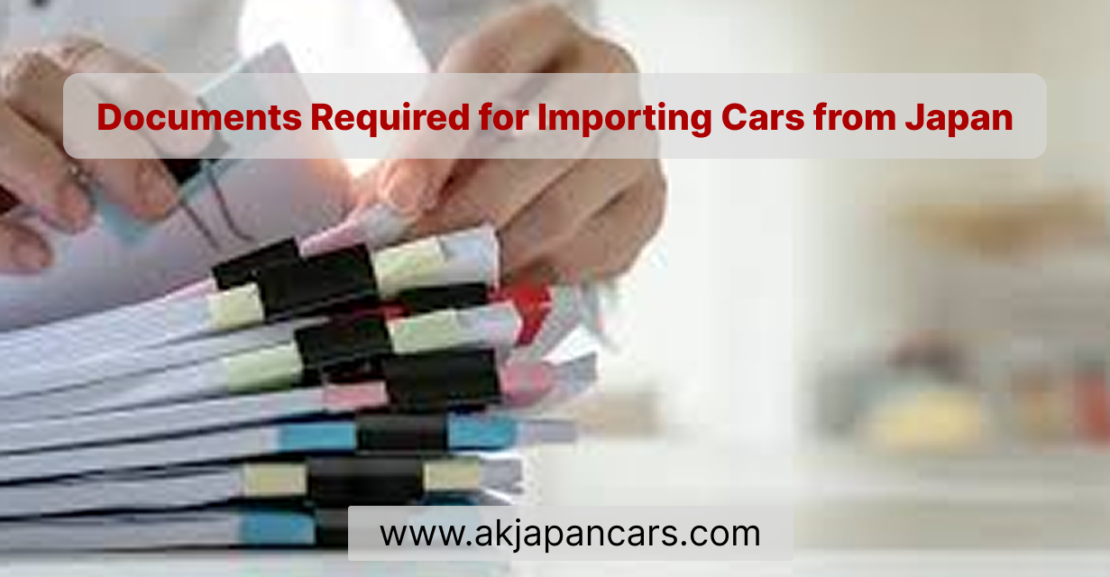Introduction
Importing a car from Japan has become quite popular these days. Many people choose Japanese cars because they are well-built, reliable, and often come at a lower price compared to local options. Whether you’re buying a car for personal use or business, getting it from Japan can be a smart decision.
But before your dream car arrives at your doorstep, there’s an important part of the process you shouldn’t ignore — the paperwork. Having the right documents in place is very important to avoid any delays, extra charges, or legal issues at customs.
In this blog, we’ll walk you through all the important documents you need to import a car from Japan. Don’t worry — we’ll keep everything simple and easy to understand, so you know exactly what to prepare!
1. Pre-Shipment Documents
Before your car even leaves Japan, there are a few important documents that need to be prepared. These papers help confirm that everything about the sale, shipment, and car details is correct. Here are the main ones:
1. Purchase Invoice
This is the bill you get from the seller when you buy the car. It includes details like the price, car model, and seller’s information. Think of it as a receipt that proves you’ve bought the car.
2. Bill of Lading
This is a document from the shipping company that confirms your car has been loaded onto the ship. It includes shipping details like the port of departure, arrival, and vehicle info. You’ll need this to claim your car when it reaches your country.
3. Export Certificate (Japanese Title)
This is the official document from Japan that shows the car is legally allowed to leave the country. It also includes ownership history and other details about the vehicle.
4. Inspection Certificate
In some countries, it’s necessary to have a car inspected before it’s shipped. The inspection checks if the car meets safety and environmental standards. This document is proof that your car has passed the check.
5. Insurance Certificate (if applicable)
If you choose to insure your car during shipping, you’ll get an insurance certificate. It covers damages or loss while the car is on its way to you. It’s not always required, but it’s a smart idea to have it.
2. Post-Arrival Documents
Once your car reaches your country, the paperwork isn’t over yet! You’ll need to present a few more documents to get your car cleared through customs and registered for use. Here’s what you’ll need after the car arrives:
1. Customs Declaration Form
This is a form you fill out to declare that you’re importing a car. It includes all the basic details like the car’s value, type, and shipping info. Customs officers use this to check if everything is legal and to calculate any taxes or duties.
2. Import Permit (if required)
Some countries need you to get an import permit before the car arrives. It’s official permission that allows you to bring a foreign car into the country. Make sure to check with your local authorities if this is needed.
3. Roadworthiness Test Certificate
Before registering your car, it may need to pass a safety and fitness test in your country. This certificate proves that the car is safe to drive on local roads.
4. Vehicle Registration Document
Once the car is approved, you’ll need to register it in your name. This document shows that you are the legal owner of the car in your country.
5. Tax Payment Proof
During the import process, you may have to pay customs duties, import taxes, or VAT. Once paid, you’ll get a receipt or proof of payment. This is usually needed before you can register the vehicle.
3. Country-Specific Requirements
While many documents are the same for most countries, some places have extra rules or special documents you need to be aware of. That’s why it’s always a good idea to check the specific import guidelines of your country before you start the process.
Here are a few quick examples:
· United States (USA)
- The car must be 25 years old or more (to meet exemption rules).
- You’ll need to fill out EPA and DOT forms.
- A Customs and Border Protection (CBP) Entry Summary form is required.
· United Kingdom (UK)
- Requires IVA (Individual Vehicle Approval) or SVA (Single Vehicle Approval) test.
- You must notify HMRC and pay VAT within 14 days.
- A NOVA (Notification of Vehicle Arrival) application is necessary.
· Pakistan
- Only right-hand drive cars are allowed.
- Vehicles must fall under the personal baggage, gift, or transfer of residence scheme.
- You need to submit documents to Pakistan Customs along with FBR requirements.
· Kenya
- Car must not be older than 8 years from the year of manufacture.
- Must pass the QISJ (Quality Inspection Services Japan) inspection.
- Import Declaration Form (IDF) is a must.
Each country has its own rules about car age, emissions standards, taxes, and registration, so it’s best to contact your local customs office or an experienced import agent for updated info.
4. Tips for Hassle-Free Car Import
Importing a car from Japan may sound tricky, but with the right steps and preparation, it can be a smooth and exciting process. Here are some easy tips to help you avoid problems and enjoy your new ride without delays:
1.Work with a Trusted Import Agent
An experienced agent can guide you through the process, handle the paperwork, and deal with customs on your behalf. They know the rules and can save you time and headaches.
2. Double-Check All Documents
Make sure all documents (invoice, bill of lading, export certificate, etc.) are complete, correct, and match your car details. A small mistake can cause big delays at customs.
3. Check Your Country’s Import Rules Beforehand
Every country has its own requirements for importing cars. Always check what documents, inspections, or approvals are needed in advance to avoid surprises.
4. Keep an Eye on Hidden Costs
Besides the car price, there can be extra charges like shipping fees, customs duty, taxes, and registration fees. Plan your budget accordingly.
5. Make Sure the Car Meets Local Standards
Some countries have rules for emissions, safety, or vehicle age. Be sure your chosen car meets these rules before buying.
6. Keep All Paperwork Safe
Always keep copies of every document—digital and printed. You may need them during customs clearance, registration, or future resale.
Conclusion
Importing a car from Japan can be a great decision—whether you’re looking for quality, affordability, or a unique model not available locally. But to make the process smooth and stress-free, it’s very important to have all the right documents in place.
From the purchase invoice and bill of lading before shipping, to customs forms, tax receipts, and registration documents after arrival—every step matters. Understanding and preparing these documents ahead of time will save you from delays, extra costs, or even legal trouble.
Always double-check your country’s import rules and, if possible, work with a trusted import agent to make things easier. With the right planning, your dream car from Japan can arrive at your doorstep without any problems.


Hi,
This information is extremely useful for anyone looking to purchase a car from Japan.